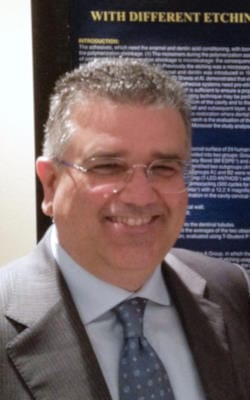Conferenza annuale CoEHAR sulla riduzione del danno
30 ottobre 2024
25+ Speakers
Catania, Italia
Dalle 9:00 alle 16:00
Argomenti principali
- Effetti del fumo tradizionale e dei dispositivi alternativi
- I benefici dei dispositivi a rischio ridotto sulla salute dei denti e della vista
- Impatto sul diabete e su altre condizioni mediche
- L'intelligenza artificiale nelle terapie per smettere di fumare
- Gli ultimi sviluppi della ricerca sulla riduzione del danno
Interviste
di Chiara Nobis

1:40

4:16

1:15

3:45

2:35

3:07

2:02

2:41

3:50

1:00

1:41

1:56

3:59

1:26

1:18

5:09

30:47
Speech
Secondhand smoke, originating from both traditional cigarettes and newer devices like electronic cigarettes and heated tobacco products (HTPs), is still not well understood by the public. In a recent study, 504 people responded to a questionnaire about the risks of active and passive smoking for oral health. 86.3% of respondents recognized active smoking as dangerous, while 79.4% and 84.9% believe that secondhand smoke from traditional cigarettes is more harmful than that from HTPs and electronic cigarettes, respectively. However, knowledge about the risks associated with these electronic devices remains confused or incomplete. These results highlight the importance of developing more effective communication strategies to disseminate clear information on the risks of secondhand smoke, not only from traditional cigarettes but also from electronic cigarettes and HTPs.
Speech
Eugenio Pedullà’s presentation at the 2024 CoEHAR National Conference introduces the “Smile Study,” an 18-month randomized, multicenter clinical trial that evaluates the effects of smoking and switching to electronic cigarettes on oral health. Smoking contributes to periodontal disease and cavities, in addition to causing tooth discoloration, which negatively impacts individuals’ social lives.
The study aims to compare plaque and tooth color among smokers, former smokers, and non-smokers, with particular attention to users of combustion-free systems (ENDS). Preliminary results indicate that electronic cigarette users show lower levels of plaque and discoloration compared to traditional smokers, with both aesthetic and functional benefits. The study suggests that the use of ENDS could improve the aesthetics of the smile and reduce periodontal risks for smokers who are unable to quit completely, thereby enhancing psycho-physical well-being.
Speech
Fabio Beatrice’s presentation highlights the effectiveness of electronic cigarettes compared to nicotine-based medications in helping smokers quit. According to the latest Cochrane review from 2023 and a study published in the New England Journal of Medicine in 2024, nicotine delivered via electronic cigarettes appears to be as effective, if not more so, than traditional medications for smoking cessation.
In a randomized study involving 1,246 participants, 28.9% of the group treated with electronic cigarettes achieved continuous smoking abstinence, compared to 16.3% of the control group, with a relative risk of 1.77. In conclusion, electronic cigarettes prove to be a valid tool both for smokers who are not ready to quit and for those who fail with other methods, offering a second-line option in the path to cessation.
Speech
Traditional smoking represents the greatest risk to both oral and systemic health compared to alternatives. However, despite the risk reduction benefits, alternatives do not completely eliminate the dangers associated with nicotine consumption. The study encourages further research to better understand the long-term effects of these alternatives and supports total smoking cessation as the ideal option for health.
Speech
Traditional smoking represents the greatest risk to both oral and systemic health compared to alternatives. However, despite the risk reduction benefits, alternatives do not completely eliminate the dangers associated with nicotine consumption. The study encourages further research to better understand the long-term effects of these alternatives and supports total smoking cessation as the ideal option for health.
Speech
Exposure to secondhand smoke, whether from conventional cigarettes or alternative products like heated tobacco, is one of the main health concerns for children. Although electronic cigarettes and heated tobacco devices are often perceived as less harmful alternatives to traditional cigarettes, a recent study of ours published in the journal *Environ Pollut.* (Loffredo 2024 Mar 15;345:123304) has shown that these products can also have a negative impact on young people’s health, particularly on the cardiovascular system.
Speech
Piero Portincasa’s presentation examines the impact of conventional smoking and alternative products on metabolic syndrome (MetS) and gut microbiota. Smoking is associated with a higher risk of MetS and cardiovascular diseases, with an incidence 1.26 times higher in smokers compared to non-smokers, and even more so among heavy smokers. Alternative products like e-cigarettes also appear to be associated with an increased risk of MetS, especially among “dual users” who use both conventional cigarettes and combustion-free products.
Smoking negatively affects the gut microbiota, reducing its diversity and altering bacterial populations, promoting conditions such as intestinal dysbiosis. Cigarette smoke and nicotine consumption influence intestinal permeability and increase inflammation, contributing to a state of metabolic imbalance. Recent studies show that smoking cessation leads to significant improvements in gut microbiota, with an increase in bacterial diversity and a rebalancing of microbial populations.
In conclusion, although combustion-free products may represent a harm reduction compared to traditional smoking, there are still risks to metabolic health, highlighting the need for further long-term studies to fully understand the effects of these products on metabolic syndrome and the microbiota.
Speech
Lucia Spicuzza’s presentation explores the impact of using e-cigarettes and heated tobacco products (HTPs) on patients with chronic obstructive pulmonary disease (COPD). With a global prevalence of 10.3% among people over 40, COPD is one of the leading causes of death worldwide. Abstinence from traditional smoking is the only evidence-based strategy to slow the progression of the disease, yet many COPD patients continue to smoke.
Studies suggest that e-cigarettes may reduce toxin levels compared to traditional smoking, but the long-term effects remain uncertain. However, there is moderate evidence indicating a potential benefit in smoking cessation for patients who use these devices, with a higher likelihood of quitting compared to those using nicotine replacement therapies.
Combustion-free devices appear to offer benefits for COPD patients who are unable to quit smoking, but further long-term research is needed to assess their actual effects on respiratory health.
Speech
The presentation covers the in vitro effects of e-cigarettes and heated tobacco products on oral cells, comparing them with traditional cigarettes. The research, conducted by various experts, explores the biological effects on oral mucosal cells, including gingival fibroblasts, oral keratinocytes, and dental pulp stem cells. The results show that, compared to traditional cigarettes, the use of alternative devices like e-cigarettes and IQOS causes reduced cellular damage, especially in bronchial and epithelial tissues.
Specific tests (MTT assay for cell viability, ELISA for IL-1β and IL-6, and immunofluorescence for DNA damage) reveal that switching from traditional cigarettes to alternative devices shows less harmful effects on tissues. In oral keratinocytes, the harmful effects are reduced but not completely eliminated following the switch to e-cigarettes and IQOS. Overall, the study concludes that these devices may represent a harm reduction compared to traditional smoking, although tissue recovery varies depending on the cell type and exposure duration.
Speech
The presentation covers the in vitro effects of e-cigarettes and heated tobacco products on oral cells, comparing them with traditional cigarettes. The research, conducted by various experts, explores the biological effects on oral mucosal cells, including gingival fibroblasts, oral keratinocytes, and dental pulp stem cells. The results show that, compared to traditional cigarettes, the use of alternative devices like e-cigarettes and IQOS causes reduced cellular damage, especially in bronchial and epithelial tissues.
Specific tests (MTT assay for cell viability, ELISA for IL-1β and IL-6, and immunofluorescence for DNA damage) reveal that switching from traditional cigarettes to alternative devices shows less harmful effects on tissues. In oral keratinocytes, the harmful effects are reduced but not completely eliminated following the switch to e-cigarettes and IQOS. Overall, the study concludes that these devices may represent a harm reduction compared to traditional smoking, although tissue recovery varies depending on the cell type and exposure duration.
Speech
Silvio Festinese’s presentation at the 2024 CoEHAR National Conference focuses on the role of the doctor-patient relationship in smoking harm reduction. It highlights how the most authoritative source for smokers is their doctor’s advice, according to a 2021 Censis survey. However, only a portion of doctors discuss smoking in detail with patients and offer concrete support for cessation.
A survey of over 1,000 Italian doctors shows that although 80-97% take a smoking history, only 9% inquire about secondhand smoke exposure. About 76% advise total cessation, while 10-20% suggest reducing the number of cigarettes. Only a minority (22-40%) provide specific instructions on how to quit, and less than half (46%) link smoking to the patient’s specific illnesses.
Moreover, knowledge of combustion-free devices (such as e-cigarettes) is limited among doctors, with less than 12% in favor of their use. Festinese emphasizes the importance of raising awareness among healthcare professionals about harm reduction options and smoke-free devices.
Speech
Lorien Abroms’ presentation examines the reliability of chatbot-based large language models (LLMs) for smoking cessation. The study compared three chatbots (WHO’s ChatGPT, BeFreeGPT, and BasicGPT) to assess their ability to provide responses consistent with smoking cessation guidelines. An adherence index was developed with criteria such as craving management, social support, and language clarity.
The results show an overall adherence rate of 57.1%, with good performance in areas like clear language and recommending professional support, but gaps in recommendations for alternative medications and some responses containing misinformation. The study highlights the usefulness of chatbots for common questions but remains uncertain about their performance on less frequent inquiries. It concludes that LLMs can be a promising tool for smoking cessation support but need improvements to ensure safety and effectiveness.
Speech
Thomas Brandon’s presentation at the 2024 CoEHAR National Conference explores the history of the “drinking controversy” and its resemblance to the contemporary debate on e-cigarettes for harm reduction. Brandon examines the disease model of alcoholism and how the concept of “controlled drinking” challenged the dogma of total abstinence. Studies like those by D.L. Davies and the Rand Report demonstrated that some individuals could manage alcohol without severe relapses, sparking a wave of criticism.
Brandon highlights similarities with the debate over e-cigarettes, where scientists and advocacy groups are often divided. Just as with “controlled drinking,” e-cigarettes are subject to misinformation and polarized opinions, with the risk that concerns over youth safety may overshadow the potential benefits for adult smokers.
In conclusion, Brandon suggests that changing public perception requires effective communication and time to accept new scientific data, as happened with “controlled drinking.”
Speech
Sarah Pratt’s presentation explores the challenges of using e-cigarettes for tobacco harm reduction in the United States, highlighting how many people with serious mental illness (SMI) have high smoking rates and difficulty quitting. Despite the growing use of e-cigarettes as a harm reduction tool, health concerns persist, including risks to lung health and the potential to encourage youth smoking.
Recent studies show that e-cigarettes reduce toxin exposure compared to traditional cigarettes. However, opinions are divided: while some health organizations, like the American Cancer Society, initially saw e-cigarettes as less harmful, recent statements emphasize increasing concerns about their long-term effects. Pratt concludes with a question about how to improve the perception of e-cigarettes as a harm reduction tool, given that many people consider them as harmful as traditional smoking.
Speech
The presentation will address the potential health risks associated with the use of electronic nicotine delivery systems (ENDS), including electronic cigarettes and heated tobacco products. The results of research conducted at Alma Mater in Bologna will be presented, highlighting the presence of toxic substances in the aerosols emitted by these devices and their harmful effects on respiratory tissues and other organs. The presentation will discuss the importance of understanding the differences between risk reduction in terms of exposure and risk reduction in terms of health, calling for greater awareness and further scientific studies, especially given the growing popularity of ENDS among young people.
Con esperti di prestigiose istituzioni, tra cui:
Moffitt Cancer Center
Il Moffitt Cancer Center è un rinomato istituto di ricerca sul cancro situato in Florida, negli Stati Uniti. È noto per i suoi approcci innovativi al trattamento del cancro e per la ricerca all'avanguardia nella prevenzione e nella cura di varie forme di cancro.
Dartmouth College
Il Dartmouth College è un'università della Ivy League situata nel New Hampshire, negli Stati Uniti. È riconosciuta per la sua eccellenza accademica e per la ricerca innovativa in vari campi, tra cui gli studi sulla salute pubblica e la ricerca sulle dipendenze.
George Washington University
La George Washington University, situata a Washington D.C., è un prestigioso istituto di ricerca privato. È particolarmente rinomata per i suoi programmi di politica sanitaria, salute pubblica e scienze mediche, con una forte attenzione alla ricerca applicata.
Milken Institute School of Public Health
La Milken Institute School of Public Health fa parte della George Washington University. È una delle principali scuole di salute pubblica negli Stati Uniti, nota per la sua ricerca innovativa e il suo impatto sulle politiche sanitarie globali e nazionali.
Speakers

Riccardo Polosa
Fondatore di CoEHAR, esperto di riduzione del danno da tabacco e sigarette elettroniche, ha condotto studi pionieristici sull'efficacia e la sicurezza delle sigarette elettroniche, con un impatto scientifico significativo.

Giovanni Li Volti
Direttore del CoEHAR e professore ordinario di Biochimica presso l'Università di Catania, ha ricevuto premi internazionali per le sue ricerche. È specializzato in scienze pediatriche e farmacologia.

Pasquale Caponnetto
Professore di Psicologia Clinica presso l'Università di Catania. Esperto in trattamenti per la cessazione del fumo per pazienti con disturbi psichiatrici, è specializzato in psicoterapia relazionale e Cyber Health. Coordina la ricerca sulle terapie di riduzione del danno.

Piero Portincasa
Professore ordinario di Medicina Interna presso l'Università di Bari. Specialista in medicina interna e direttore di cliniche mediche, è esperto di disturbi cardio-metabolici e malattie rare. Ha ricevuto numerosi riconoscimenti internazionali per la sua carriera accademica.

Silvio Festinese
Cardiologo con esperienza nella medicina di comunità e nell'insegnamento in varie università. Ricercatore, supervisore di ambulatori, membro di diversi comitati nazionali e organizzatore di conferenze scientifiche.

Gualberto Gussoni
Medico e Direttore Scientifico della FADOI. Esperto di farmacologia e ricerca clinica, è professore universitario e autore di oltre 90 articoli. È membro dell'EMA e promotore di progetti nazionali sulla sperimentazione clinica.

Lorien Abroms
Preside associato presso la Milken Institute School of Public Health. Esperta di promozione della salute digitale, ha sviluppato programmi innovativi come Text2Quit. Ha all'attivo oltre 100 pubblicazioni e co-dirige il GW Bright Institute.

Francesco Ludovichetti
Specialista in odontoiatria pediatrica. Esperto di odontoiatria e parodontologia pediatrica, ha pubblicato oltre 40 articoli. Relatore internazionale, è anche visiting professor e medico privato in Italia.

Sara Manti
Pediatra e ricercatrice presso l'Università di Messina, è presidente regionale della SIAIP e membro del consiglio direttivo regionale e nazionale nel campo dell'allergologia e delle malattie respiratorie pediatriche.

Thomas Brandon
Esperto di dipendenza da tabacco e di interventi per la cessazione, ha condotto ricerche innovative, è stato presidente della Society of Addiction Psychology e ha ricevuto premi per il suo contributo alla ricerca sul tabacco.

Fabio Beatrice
Direttore scientifico del MOHRE. Fondatore del Centro per la Disassuefazione dal Fumo presso l'Ospedale San Giovanni Bosco di Torino, sostiene l'uso della sigaretta elettronica per ridurre i danni nei forti fumatori, supportando le politiche di riduzione del rischio.

Lorella Marinucci
Ricercatrice presso l'Università di Perugia, studia istologia, embriologia e biocompatibilità dei materiali medici. Ha pubblicato 62 articoli scientifici su argomenti quali la tossicità, le sindromi genetiche e l'implantologia.

Stefano Pagano
Professore associato presso l'Università di Perugia. Specializzato in materiali dentali e tecnologie protesiche, conduce ricerche sui nanomateriali attivi e sulla citotossicità, con numerose pubblicazioni internazionali in campo dentale.

Giuseppe Lo Giudice
Medico e professore universitario specializzato in Odontostomatologia, ricercatore con oltre 700 pubblicazioni. È professore e direttore clinico presso l'Università di Messina, attivamente impegnato in campo odontoiatrico e accademico dal 1980.

Eugenio Pedullà
Professore associato di Odontoiatria Conservativa ed Endodonzia presso l'Università di Catania, è un esperto di Endodonzia e Odontoiatria Conservativa, autore di pubblicazioni e relatore a conferenze internazionali.

Lucia Spicuzza
Esperta in medicina respiratoria e disturbi del sonno. È specializzata in disturbi respiratori legati al sonno, controllo respiratorio e cardiovascolare, apnea pediatrica, asma bronchiale e medicina d'alta quota.

Simone Ronsisvalle
Ricercatore di chimica farmaceutica. Si occupa della progettazione e della sintesi di composti farmaceutici, con particolare attenzione ai ligandi neuroprotettivi, antitumorali e antinfiammatori, oltre a studi sul dolore cronico e sui recettori degli oppioidi.

Silvia Granata
Ricercatrice in scienze farmaceutiche e biotecnologiche. Ha conseguito un dottorato di ricerca in scienze biotecnologiche e lavora a progetti AIRC e PNRR presso istituti di ricerca nel campo della farmacologia.
Speakers coinvolti
1
Ospiti Internazionali
1
Università
1
Partecipa al
No Tobacco Day 2024
Se sei interessato a partecipare alla “Conferenza Annuale CoEHAR sulla riduzione del danno” o vuoi ricevere materiale informativo sull’harm reduction in Italia e nel mondo compila il contact form. Ti risponderemo il prima possibile.
